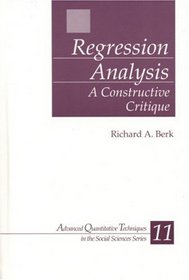Search -
Regression Analysis: A Constructive Critique (Advanced Quantitative Techniques in the Social Sciences)
Regression Analysis A Constructive Critique - Advanced Quantitative Techniques in the Social Sciences
Author:
Berk has incisively identified the various strains of regression abuse and suggests practical steps for researchers who desire to do good social science while avoiding such errors." — --Peter H. Rossi, University of Massachusetts, Amherst "I have been waiting for a book like this for some time. Practitioners, especially those doing a... more »Professor of Demography & Sociology, University of Pennsylvania Regression is often applied to questions for which it is ill equipped to answer. As a formal matter, conventional regression analysis does nothing more than produce from a data set a collection of conditional means and conditional variances. The problem, though, is that researchers typically want more: they want tests, confidence intervals and the ability to make causal claims. However, these capabilities require information external to that data themselves, and too often that information makes implausible demands on how nature is supposed to function. Convenience samples are treated as if they are random samples. Causal status is given to predictors that cannot be manipulated. Disturbance terms are assumed to behave not as nature might produce them, but as required by the model. Regression Analysis: A Constructive Critique identifies a wide variety of problems with regression analysis as it is commonly used and then provides a number of ways in which practice could be improved. Regression is most useful for data reduction, leading to relatively simple but rich and precise descriptions of patterns in a data set. The emphasis on description provides readers with an insightful rethinking from the ground up of what regression analysis can do, so that readers can better match regression analysis with useful empirical questions and improved policy-related research. "An interesting and lively text, rich in practical wisdom, written for people who do empirical work in the social sciences and their graduate students."
--David A. Freedman, Professor of Statistics, University of California, Berkeley (20070621)
Author:
Berk has incisively identified the various strains of regression abuse and suggests practical steps for researchers who desire to do good social science while avoiding such errors." — --Peter H. Rossi, University of Massachusetts, Amherst "I have been waiting for a book like this for some time. Practitioners, especially those doing a... more »Professor of Demography & Sociology, University of Pennsylvania Regression is often applied to questions for which it is ill equipped to answer. As a formal matter, conventional regression analysis does nothing more than produce from a data set a collection of conditional means and conditional variances. The problem, though, is that researchers typically want more: they want tests, confidence intervals and the ability to make causal claims. However, these capabilities require information external to that data themselves, and too often that information makes implausible demands on how nature is supposed to function. Convenience samples are treated as if they are random samples. Causal status is given to predictors that cannot be manipulated. Disturbance terms are assumed to behave not as nature might produce them, but as required by the model. Regression Analysis: A Constructive Critique identifies a wide variety of problems with regression analysis as it is commonly used and then provides a number of ways in which practice could be improved. Regression is most useful for data reduction, leading to relatively simple but rich and precise descriptions of patterns in a data set. The emphasis on description provides readers with an insightful rethinking from the ground up of what regression analysis can do, so that readers can better match regression analysis with useful empirical questions and improved policy-related research. "An interesting and lively text, rich in practical wisdom, written for people who do empirical work in the social sciences and their graduate students."
--David A. Freedman, Professor of Statistics, University of California, Berkeley (20070621)
ISBN-13: 9780761929048
ISBN-10: 0761929045
Publication Date: 7/17/2003
Pages: 280
Edition: 1
Rating: ?
ISBN-10: 0761929045
Publication Date: 7/17/2003
Pages: 280
Edition: 1
Rating: ?
0 stars, based on 0 rating
Publisher: Sage Publications, Inc
Book Type: Hardcover
Members Wishing: 0
Reviews: Amazon | Write a Review
Book Type: Hardcover
Members Wishing: 0
Reviews: Amazon | Write a Review
Genres:
- Health, Fitness & Dieting >> Mental Health >> General
- Nonfiction >> Social Sciences >> Research
- Nonfiction >> Social Sciences >> Sociology >> General
- Nonfiction >> Social Sciences >> Statistics
- Science & Math >> Mathematics >> General




